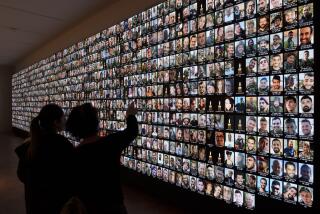Christopher Is Upbeat After Syrian Meeting : Mideast: ‘Substantial progress’ is made in quest to end toughest chapter of the Arab-Israeli conflict.
DAMASCUS, Syria — Secretary of State Warren Christopher held almost four hours of talks with Syrian President Hafez Assad on Friday and said they made “substantial progress” in finding a new approach to resolve the toughest chapter of the Arab-Israeli conflict.
Christopher, who brought fresh ideas put forward by Israeli Prime Minister Shimon Peres during his two-day visit to Washington this week, said Syria and Israel clearly want to press forward with mediation with some urgency.
“The response we heard was positive, and there was a willingness to begin to offer concepts from here as well. They clearly gave us a basis to create a connection,” a senior U.S. official told reporters accompanying Christopher. “What we’re seeing right now is a different kind of engagement than we’ve had over the past several months.”
Christopher’s previous shuttle diplomacy deadlocked in June when Syria balked at allowing Israel to establish an early warning system on the Golan Heights in exchange for return of the strategic territory captured by Israel during the 1967 Arab-Israeli War.
That land-for-peace swap has long been the premise for mediation. But both sides now seem to have dropped issue-by-issue negotiations in favor of a more comprehensive approach that may ultimately include more than just Syria and its client state, Lebanon.
On his U.S. visit, Peres emphasized a pan-Mideast peace as the final phase, an approach that may appeal to Assad, who has long considered himself the conscience of the Arab world.
“Each side over the last several months was speaking in terms of conditions. Everything was presented in terms of ‘You had to meet my conditions and then I would do the following.’ Now each side is more open,” the senior official said.
Israel also dropped its demand that security and military matters be settled before other issues are broached.
“It’s not that the details are not important. What’s different is that . . . neither side is at this point trying to impose a set of conditions in advance,” the official added.
In the aftermath of Israeli Prime Minister Yitzhak Rabin’s assassination last month, both parties have told the United States that they feel a need to intensify the search for peace, Christopher said.
In an unusually positive editorial before talks began, the state-controlled Syrian press, a barometer of official positions, said Peres’ comments during his two-day Washington visit brought the peace process “a step forward toward reality.”
*
Peres’ statement that peace is more important than next October’s Israeli elections “no doubt will provide a better atmosphere to push the entire region to an era of peace and prosperity,” the Syrian daily Tishrin said this week.
Christopher flew to Jerusalem after his meeting in Damascus, which was so upbeat that there is already talk of another round of shuttle diplomacy in early January.
The United States may have a higher profile in this critical last phase of the peace process than it has had in the past.
“We’d be prepared to put forward some American ideas at the right moment. Both the parties have indicated that, at the right time, that might be welcome,” Christopher told reporters.
But he also warned that the change in tone and mood will not substitute for a change in substance. And gaps between the parties remain “substantial,” he noted. Syria, at nine times the size of Israel, has always been Israel’s most formidable foe.
U.S. officials traveling with the secretary denied Israeli and Lebanese press reports that Israel has offered to withdraw its troops from a security enclave in southern Lebanon as an opening gesture.
Israel has maintained a significant presence in Lebanon since its 1978 invasion. Lebanese newspapers reported this week that Lebanon had offered to deploy 25,000 troops in the south to ensure an end to the almost daily clashes between Israel and Islamic extremists in Lebanon.
More to Read
Sign up for Essential California
The most important California stories and recommendations in your inbox every morning.
You may occasionally receive promotional content from the Los Angeles Times.










